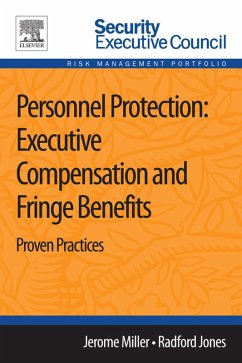Personnel Protection: Executive Compensation and Fringe Benefits is a video presentation. Length: eight minutes. According to IRS code, any property or service that an executive receives in lieu of or in addition to regular taxable wages is a fringe benefit that may be subject to taxation. There are exceptions to this rule, however, which may include security services provided. In Personnel Protection: Executive Compensation and Fringe Benefits, the factors necessary to exclude security-related expenses from the executive's taxable gross income are defined, and the benefits to both the executive and the company are discussed. This eight-minute video presentation of narrated slides is one of 11 modules in the Personnel Protection presentation series, which is designed for companies considering an executive security program or for companies with an executive security program already in place. Each presentation in the series is narrated by Jerome Miller, formerly a commander in the Detroit Police Department and senior manager of international and special security operations at Chrysler Corporation, and Radford Jones, formerly manager of global security and fire protection at Ford Motor Company after 20 years with the U.S. Secret Service. Other topics in this series include concepts of executive security; advance procedures; the executive threat assessment profile; the selection of executive security personnel; kidnapping issues and guidelines; security procedures for residences; and worksite, aircraft, and vehicle operations. Personnel Protection: Executive Compensation and Fringe Benefits is a part of Elsevier's Security Executive Council Risk Management Portfolio, a collection of real world solutions and "how-to" guidelines that equip executives, practitioners, and educators with proven information for successful security and risk management programs. - The eight-minute, visual PowerPoint presentation with audio narration format is excellent for group learning - Covers the specific section of the IRS code that defines "fringe benefits" and explains how it impacts the executive's compensation when security services are provided - Describes the features of a protection program that allow for the exclusion of these services from the executive's taxable gross income
Dieser Download kann aus rechtlichen Gründen nur mit Rechnungsadresse in A, B, BG, CY, CZ, D, DK, EW, E, FIN, F, GR, HR, H, IRL, I, LT, L, LR, M, NL, PL, P, R, S, SLO, SK ausgeliefert werden.









